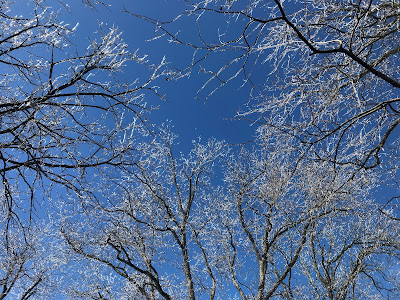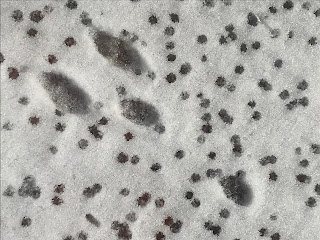 |
| The sparkly aftermath of the last ice storm |
It's not that I relish being a pessimist, but as I often remind people who question my lack of sanguinity, "pessimists are seldom disappointed; and when they are, it's a good thing." I'm also not fond of the pabulum some folks seem to think of as good news (no, winning umpteen gold medals in the Olympics is not the most important thing in our collective public life and is not a measure of our national wellbeing). Although I do relish watching Nathan Chen demonstrating his prowess on ice, was not glued to the set for things I don't understand: "big air" and "half pipe," for example. And in order to keep my blood pressure at a reasonable level, I'm avoiding most television in general so as not to be exposed to the idiocy going on at the northern border.
Still, I do not want to spend the rest of my life being pissed off at everything, and so consumed with negativity that I can't hope that things could change.
I'm helped in this regard by a few writers I admire, especially Kim Stanley Robinson. Since Ursula K. Le Guin's death, he's taken up the top slot in my SF pantheon, because he's by far the best writer and the most thoughtful prognosticator of the future available--at least that I know of. After I finished The Ministry For The Future, I went back to his earlier book, Aurora, which I'd abandoned for some reason, and have just completed that as well. What I especially admire about his work, besides his fidelity to science, his depth of research, and his enormous imagination, is his ability to cast a reasonably optimistic eye toward the possibility that human beings can stop being stupid.
So, even though a large part of Aurora is about human arrogance and the failure of big, ill-conceived dreams about space travel, generation ships, and colonization of earth-like planets, its ultimate message is that we can learn to be better people. We can, instead of looking for other places to live by terraforming them, spend our intellectual and economic resources on terraforming earth instead. And although Ministry For The Future begins with a terrifying event (a monster heat wave in India), described so compellingly that it haunts my dreams to this day, it's also about how people can learn to begin to fix what we've screwed up so far.
Le Guin's oeuvre is steeped in similar considerations, both philosophical and environmental, and I'm thus happy to find someone whose work carries on some of her major themes. But it's especially gratifying to see that Robinson (like Le Guin) doesn't just talk about the future, he actively participates in its making.
Now, I'm not easily inspired to do anything. All of my endeavors, however minute, require long-term thinking through, much dawdling, lots of second-guessing, and increasingly small amounts of available energy. But in acknowledgement of the Year of the Tiger I've decided to dedicate an occasional essay on The Farm to locating resources that can help us forge a path, even a narrow one, toward something better than what we've got now.
One paving stone on that path for me is the ability to use wisely technologies with potential to do harm. The obvious culprits are social media of all sorts, but particularly the easiest ones to abuse: Facebook and Twitter, plus platforms like Reddit and Quora. I'll talk about these in more depth at some point, but for now it helps just to be selective about how we use them, and to be aware of the extent to which they dominate our lives. For some insights, see Jaron Lanier's Ten Arguments for Deleting Your Social Media Accounts Right Now, and Jenny Odell's How to Do Nothing: Resisting the Attention Economy.
We should already be able to recognize the technologies we've been depending on long enough to bring us to critical masses and tipping points in the near future: nukes, fossil fuels, internal combustion. But the danger list also includes our dependence on processes that have driven us to unprecedented amounts of consumption and waste and the economic habits that foster it all.
The rest of the path can be built with much larger amounts of effort of kinds that are already going on. One exemplar is the rise of "Slow" movements: food, fashion, design--and even slow philosophy (as an antidote to fast politics), which arise from notions of sustainability and associated ideas about permaculture and regenerative farming and ranching practices. These are all ideas I'd like to explore in future on this blog, but for the moment I urge anyone who's interested to begin by looking through the interwebs (making good use of this problematic technology) for more information and to see what's being talked about. Another good source is the realm of digital publications and zines that focus on these issues. My last post on Owl's Cabinet featured little reviews of some of my favorites, and I've since located more. I'll be listing all of them on the sidebar of this blog (under "Media"), along with the sources already there under "Education of Desire."
It's not easy to combat the naysayers, or to avoid getting caught up in the deep negativity that's been engendered by the events of the last couple of years. I can't say that my assessment of our ability to work things out for the better is any more firmly grounded than it was in January of 2017 (or January of 2021, for that matter). But hope abides. Especially when the sun's out and the weather is fine. Or even when the ice-clad trees sparkle after a February snow storm that doesn't cause widespread power failures and frozen pipes. Or when bunnies leave their footprints behind in the snowy garden, with polka dots of melting ice as a backdrop.
And then there's the promise of the new year. I've been fond of the lunar new year since I was a child. In both Japan and Taiwan, it was celebrated with delicious sweets, colorful ceremonies and dancing, fireworks, puppetry, and (even for children) introspection. I returned to the United States in 1962, another Year of the Tiger, and my Chinese and Taiwanese friends thought that it was an auspicious time to do so, assuring my mother that the courage and bravery associated with tigers would help me make the necessary adjustments. I'm not sure how brave I was (I ended up staying in the States instead of joining my father in England), but maybe that's what was involved in my choice to remain with my grandmother, in my home town, for the next year. I certainly developed a strong attachment to place during that time, and it took hold fiercely. Much as it has here, in my little hundred year-old bungalow on its little half acre of small-scale utopia.
The future seems more uncertain to me now than it ever has--even after having lived through some major crises in the past. With another Russian conflict building in Ukraine, things don't seem particularly promising. But I do like to think that there's always hope, and so will be spending more my time learning from those who are practicing ways to build it.


No comments:
Post a Comment